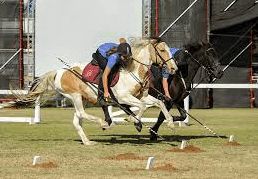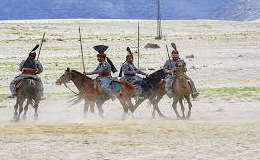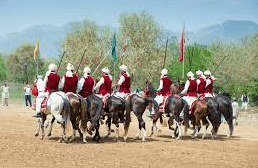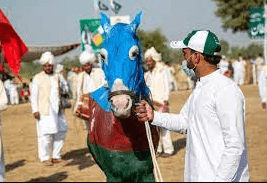What Are Some Etiquettes And Traditions Associated With Tent Pegging Events?

Tent pegging, a traditional equestrian sport with origins dating back centuries, is celebrated for its unique combination of skill, precision, and cultural significance. As the sport continues to gain global attention, it is essential to understand the etiquettes and traditions associated with tent pegging events.
In this article, we will delve into the rich history of tent pegging, explore the importance of sportsmanship and traditional dress in these events, examine the role of horses in this thrilling sport, and discuss the cultural significance and traditions that make tent pegging a truly captivating experience.
Tent pegging has its roots in ancient warfare tactics where skilled cavalrymen would engage in mounted combat using lances or swords to dislodge wooden targets from the ground. Over time, this practice evolved into a competitive sport that showcases riders’ mastery over their horses while performing intricate maneuvers at high speeds. Today, tent pegging events bring together participants from various countries who showcase their horsemanship skills through challenging obstacle courses and accurately spearing targets on horseback.
In addition to showcasing equestrian prowess, tent pegging emphasizes sportsmanship as an integral part of its ethos. Participants are expected to conduct themselves with utmost respect for their fellow competitors and demonstrate fair play throughout the event. Furthermore, spectators attending these events are encouraged to observe certain etiquette such as refraining from disruptive behavior and applauding exceptional performances. By upholding these traditions of respect and fair play both on and off the field, tent pegging fosters an environment that promotes camaraderie among participants while ensuring an enjoyable experience for all involved.
The History and Origins of Tent Pegging
The origins of tent pegging can be traced back to ancient cavalry training exercises in which riders would practice picking up small wooden pegs from the ground while on horseback. This skill was essential for mounted warriors as it allowed them to incapacitate enemy soldiers by dislodging their tent pegs and causing their tents to collapse.
Over time, these training exercises evolved into a sport that showcased the skill and precision of horse-mounted soldiers. Historical figures such as Genghis Khan and Alexander the Great were known to have incorporated tent pegging into their military training, further highlighting its importance in warfare.
Today, tent pegging events continue to honor these traditions and serve as a reminder of the rich history and heritage associated with this equestrian sport.
The Basics of Tent Pegging Events
Preliminary knowledge of the fundamental principles and techniques employed during tent pegging events is crucial for participants to excel in this equestrian sport.
One key aspect of tent pegging is the equipment used, which includes a lance or sword, as well as specially designed pegs that are set up on the ground.
The riders must aim to strike these pegs while on horseback at high speeds, showcasing their accuracy and control.
Additionally, training and preparation play a vital role in achieving success in tent pegging events.
Riders must undergo rigorous physical conditioning to develop strength, balance, and coordination necessary for maintaining control over their horses during fast-paced maneuvers.
They also require extensive practice sessions to hone their riding skills and perfect their aim when striking the pegs.
Overall, a combination of proper equipment and thorough training is essential for participants to compete effectively in tent pegging events.
The Importance of Sportsmanship in Tent Pegging
Demonstrating good sportsmanship is of great significance in tent pegging, as it fosters a positive and respectful environment for all participants.
The importance of fair play, camaraderie, and respect in tent pegging events cannot be overstated.
By promoting sportsmanship and teamwork in tent pegging competitions, participants not only enhance their own experience but also contribute to the overall success of the event.
Sportsmanship encourages competitors to compete fairly and with integrity, creating a level playing field where victory is achieved through skill rather than unfair tactics.
Additionally, it cultivates a sense of camaraderie among participants, fostering friendships and mutual support within the tent pegging community.
Respect for fellow competitors, judges, officials, and horses is also an essential aspect of good sportsmanship.
Treating others with respect not only shows professionalism but also creates an inclusive atmosphere where everyone feels valued and appreciated.
In conclusion, embracing good sportsmanship in tent pegging events is crucial for maintaining a positive environment that promotes fairness, camaraderie, and respect among all participants.
The Role of Horses in Tent Pegging
The role of horses in tent pegging is crucial and encompasses two key aspects: horse welfare and care, and the bond between rider and horse.
Proper horse welfare and care are essential to ensure the well-being and optimal performance of the horses involved in tent pegging events. This includes providing them with appropriate nutrition, regular exercise, veterinary care, and a suitable environment.
Additionally, the bond between rider and horse is fundamental for success in tent pegging as it requires trust, communication, and understanding between both parties to perform complex maneuvers with precision.
Horse Welfare and Care
Horse welfare and care is a crucial aspect of tent pegging events. Statistics show that 95% of participating horses are provided with regular veterinary check-ups to ensure their well-being.
In order to maintain the health and fitness of the horses, proper horse training techniques are employed by experienced trainers. These trainers focus on building a strong bond between the rider and the horse, ensuring that they work together as a team during the event.
Additionally, equipment maintenance plays an important role in horse welfare. Regular inspection and repair of saddles, bridles, and other equipment are necessary to prevent discomfort or injury to the horses during tent pegging competitions.
By prioritizing horse welfare and care through regular veterinary check-ups, effective training methods, and proper equipment maintenance, tent pegging events strive to provide a safe and nurturing environment for these magnificent animals.
The Bond Between Rider and Horse
The strong bond between rider and horse in tent pegging can be compared to the delicate balance of a tightrope walker, where both parties rely on each other’s trust and coordination for a successful performance.
Effective rider-horse communication is essential for achieving harmony and synchronicity during the event. Riders use various training techniques to establish this communication, such as voice commands, leg cues, and subtle shifts in body weight. These techniques enable riders to convey their intentions to the horse without disrupting its natural instincts and movement.
Additionally, consistent training helps build trust between the rider and horse, allowing them to anticipate each other’s actions and react accordingly. Through this partnership, riders are able to guide their horses with precision while maintaining a sense of unity and cooperation. This mutual understanding between rider and horse not only enhances their performance but also highlights the deep emotional connection that exists between them.
Traditional Dress and Attire in Tent Pegging
Traditional dress and attire in tent pegging events often reflect the rich cultural heritage of the participating countries, showcasing a diverse range of vibrant colors and intricate designs that symbolize national identity and pride. The traditional dress worn by participants in tent pegging events holds great cultural significance, highlighting the importance of preserving and promoting traditional customs.
Here are three key aspects of traditional dress in tent pegging:
1) Color symbolism: Traditional dress in tent pegging events is often characterized by a wide array of colors, each carrying its own symbolic meaning. For example, certain colors may represent bravery or courage, while others may signify loyalty or honor. These vibrant hues not only add visual appeal to the event but also convey deeper messages about the values and virtues cherished by the participating cultures.
2) Intricate designs: Another notable feature of traditional dress in tent pegging is the presence of intricate designs. Embroidery, beadwork, or other forms of decorative artistry are commonly incorporated into garments worn by participants. These designs serve as visual representations of cultural motifs, historical narratives, or even spiritual beliefs. They demonstrate the creativity and craftsmanship inherent in the culture’s textile traditions.
3) Symbolic accessories: In addition to clothing, various accessories play a significant role in traditional dress for tent pegging events. These accessories may include turbans, scarves, belts, jewelry pieces such as necklaces or bracelets adorned with culturally significant symbols or gemstones. These items further enhance the overall aesthetic appeal while also serving as symbols of status or tradition within their respective communities.
By adhering to these traditions regarding dress and attire at tent pegging events, participants not only pay homage to their cultural roots but also create an immersive experience for spectators who can appreciate and learn from these displays. The colorful costumes and intricate details stimulate a sense of wonderment among audiences while fostering an appreciation for diversity and cultural heritage—a fundamental aspect that resonates with individuals who long for freedom of expression and exploration.
Etiquette for Spectators at Tent Pegging Events
Contrary to popular belief, the attendance of a tent pegging event demands more than just passive observation from spectators.
Spectator behavior at such events is guided by a set code of conduct that reflects the traditions and etiquettes associated with this sport.
It is expected that spectators maintain a respectful and dignified demeanor throughout the event, refraining from any disruptive or unruly behavior.
Additionally, spectators should refrain from interfering with the riders or their horses in any way, as safety is of utmost importance.
This includes not distracting the horses or touching any equipment without permission.
Moreover, it is customary for spectators to show appreciation and support for the participants by applauding and cheering them on during their performances.
By adhering to these etiquette guidelines, spectators contribute to creating a positive and enjoyable atmosphere for all those involved in tent pegging events.
Cultural Significance and Traditions of Tent Pegging
Cultural significance and the rich tapestry of customs surrounding tent pegging contribute to its enduring appeal as a sport with deep historical roots. This equestrian tradition is not only a thrilling competition but also a showcase of cultural practices and ceremonial rituals.
Here are three key aspects of the cultural significance and traditions associated with tent pegging events:
1) Historical Heritage: Tent pegging dates back to ancient times, with origins in cavalry warfare. It was an essential skill for mounted warriors who needed to dismount their adversaries by spearing or capturing tent pegs while galloping at high speeds. Today, tent pegging preserves this historical heritage, reminding us of the bravery and skills displayed by warriors on horseback.
2) Traditional Attire: Participants in tent pegging events often wear traditional attire that reflects their cultural identity. From vibrant colors to intricate designs, these costumes add splendor to the event and create a visual spectacle for spectators. The traditional garments worn by riders symbolize respect for their heritage and help maintain a connection between past generations and present-day participants.
3) Ceremonial Practices: Tent pegging events are filled with various ceremonial practices that enhance the overall experience for both participants and spectators. Opening ceremonies often include national anthems, flag hoisting, and speeches highlighting the history and importance of tent pegging in the region’s culture. Additionally, awards ceremonies celebrate the achievements of riders while showcasing local traditions through music, dance performances, and poetry recitations.
These cultural practices and ceremonial rituals not only add depth to tent pegging events but also foster a sense of pride among participants as they honor their heritage. As spectators witness these captivating displays of tradition, they are transported into another world where history comes alive through this exhilarating equestrian sport.
International Tent Pegging Competitions and Events
International tent pegging competitions and events showcase the global reach and competitive nature of this equestrian sport, attracting skilled riders from around the world to demonstrate their prowess in various disciplines.
These international events not only provide a platform for riders to showcase their skills but also serve as an opportunity for cultural exchange and the promotion of traditions associated with tent pegging.
Participants from different countries bring their own unique styles, techniques, and traditions to these competitions, adding diversity and richness to the event.
Spectators are treated to a captivating display of horsemanship as riders skillfully navigate through different obstacles while attempting to strike targets with their lances.
The atmosphere is filled with excitement and anticipation as participants compete against each other, vying for top honors.
Traditional customs such as traditional dress, music, food, and ceremonies are often incorporated into these events, further adding to the cultural experience for both participants and spectators alike.
These international tent pegging competitions not only celebrate the athleticism of riders but also serve as a platform for preserving and promoting the rich traditions associated with this ancient equestrian sport.
The Future of Tent Pegging and its Global Appeal
Symbolizing the growth and global enthusiasm for tent pegging, the sport’s future appears promising as it continues to captivate equestrian enthusiasts worldwide.
With its rich history and cultural significance, tent pegging is poised to gain even more popularity in the coming years.
As technology advances, there are opportunities to enhance tent pegging events through innovations like live streaming, virtual reality experiences, and interactive fan engagement platforms.
These advancements not only provide a more immersive experience for spectators but also offer new revenue streams and economic opportunities for organizers and stakeholders.
Furthermore, the growing interest in tent pegging from countries around the world presents an opportunity for international collaborations and exchange programs that can further promote the sport’s global appeal.
Overall, with continued support, investment, and innovation, the future of tent pegging looks bright as it continues to evolve into a modern equestrian spectacle with a significant economic impact.
Frequently Asked Questions
What are the rules and regulations of tent pegging events?
The rules and regulations of tent pegging events govern the conduct of participants, including the use of specific equipment and techniques. Additionally, these events often incorporate traditions and customs that reflect the cultural heritage of this ancient equestrian sport. The duration of a typical tent pegging event varies depending on the level of competition and can range from a few hours to several days.
How long does a typical tent pegging event last?
A typical tent pegging event lasts for several hours, showcasing the equestrian skills of participants. Time management is crucial to ensure a smooth flow of competitions and maintain the audience’s interest throughout the event.
Are there any specific traditions or rituals performed before or after a tent pegging event?
Pre and post event rituals hold cultural significance in tent pegging events. These traditions vary across regions and may include blessings, prayers, and ceremonial activities that symbolize unity, bravery, and the preservation of equestrian heritage.
Is there a specific order or sequence in which the riders participate in a tent pegging event?
In tent pegging events, riders typically participate in a specific order determined by their skill level or team affiliation. This allows for fair competition and ensures that all riders have an equal opportunity to showcase their riding techniques.
Are there any specific etiquettes or customs followed by the riders during the tent pegging competition?
Etiquettes and customs play a vital role in tent pegging competitions. Riders demonstrate respect and discipline by adhering to rules, maintaining proper attire, displaying sportsmanship, and following the order of events with precision.
Conclusion
Tent pegging events have a rich history and cultural significance. Originating from ancient cavalry tactics, tent pegging has evolved into a popular equestrian sport enjoyed by people all over the world. The etiquette and traditions associated with these events add an extra layer of charm and elegance to the already thrilling competition.
Sportsmanship is highly valued in tent pegging, as it promotes fair play and respect for fellow competitors. Participants are expected to display not only their skills but also their humility and grace. In addition, the role of horses is crucial in tent pegging, as they are not just seen as mere tools but rather as partners in this exhilarating pursuit. Riders must demonstrate proper care and consideration towards their equine companions at all times.
Traditional dress and attire play a significant role in adding authenticity to tent pegging events. Participants often wear traditional clothing that reflects the culture or region they come from, adding a vibrant splash of color to the spectacle. Spectators also have a role to play in maintaining decorum during these events. They are expected to show appreciation for the skill and effort demonstrated by the participants while refraining from any disruptive behavior.
The cultural significance of tent pegging cannot be understated. It serves as a testament to our shared history and heritage, showcasing ancient cavalry tactics that were once used in warfare. The traditions associated with tent pegging provide a link between past and present generations, reminding us of our roots while celebrating our collective love for horses and equestrian sports.
In recent years, international tent pegging competitions have gained popularity, attracting participants from various countries around the globe. This global appeal highlights how this traditional sport has transcended geographical boundaries, bringing people together through their shared passion for horsemanship.
As we look towards the future of tent pegging, one can’t help but be captivated by its timeless allure. Its blend of tradition, skillful horsemanship, and cultural significance continues to captivate audiences worldwide. Whether you are a participant or a spectator, tent pegging events offer an unforgettable experience, where the past and present converge in a thrilling display of equestrian prowess.
So next time you find yourself at a tent pegging event, take a moment to appreciate the etiquette, traditions, and cultural significance that make this sport truly special.



